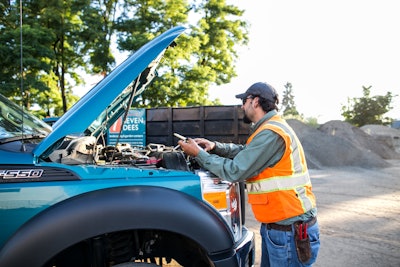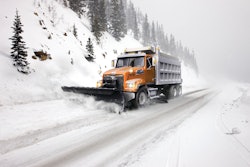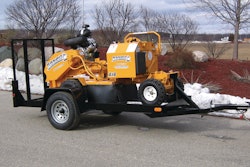
It happens every workday. Your employees hook their trailers to their trucks, load them, and perform a walk-around to ensure lights are working, safety chains are in place and the load is secured properly. Then off they go to begin their mowing route or work on an installation project.
As an owner or supervisor, is observing this procedure enough to instill confidence that your rig will return without a citation or, worse yet, be involved in an accident? The answer, of course, is no. Nor will it satisfy the watchful eyes of state and federal transportation departments if an accident were to happen.
Dennis’ 7 Dees Landscaping in Portland, Oregon, sends out dozens of construction and maintenance crews daily, most in a truck and trailer configuration. The company is a proponent of safety and serves as an example of how to create a company-wide safety culture.
Still, nearly two years ago, it found that aspects of how it managed the operation of its fleet wanting, thanks to a compliance visit from the U.S. Department of Transportation. Although the visit was procedural and not caused by an accident, Dennis’ 7 Dees since put new company guidelines in place.
As company operations manager Nathan Dirksen explains, the implementation of these guidelines were painful at first. But they also paid important dividends in the long run.
Intrastate versus Interstate
Reputable landscaping companies have safe driver programs, and teach their employees how to load, inspect and operate a trailer. They also understand and follow local and state highway regulations pertaining to the operation of vehicles and trailers. Conducting business across state lines as Dennis’ 7 Dees does, however, adds another layer of regulations and guidelines become more stringent.
“Once you cross into another state with a commercial vehicle, one with a gross vehicle weight (GVW) of 10,000 pounds or higher, your company is now subject to federal guidelines,” notes Dirksen.
Guidelines include that:
- In addition to having a clean driving record, operators need to carry a medical card that proves they have a physical every two years, maybe more often, depending on their overall physical condition.
- Drivers are required to fill out daily vehicle inspection reports. Trucks found to have issues, even things like a broken windshield wiper, are put out of service, until the issue is fixed. Technicians need to keep records of the repair as well.
- Each vehicle is required to have an accident kit that includes, among other things, an accident report form and a copy of the federal guidelines for operating a commercial vehicle.
- A formal safety training program is required. For example, Dennis’ 7 Dees requires all drivers to attend a quarterly one-hour defensive training class. It also holds monthly tailgate training on topics such as how to load a trailer and properly back one up.
Dirksen re-emphasizes that compliance to federal guidelines like the above was painful at first and costly. Paperwork alone takes 10 to 15 minutes at the end of every day and there’s time associated with keeping repair records. There’s also a cost associated with physicals and obtaining a medical card. But the effort and money spent was worthwhile, he says.
“Our drivers pay more attention to their trucks now. We have fewer breakdown on the road, truck and vehicle appearance improved, and we have fewer accidents.
“But accidents happen. The impetus for following the federal guidelines is to ensure, as a company, that you’re doing everything you can possibly do to prevent them.”
Employers’ and Supervisors’ Safety Checklist
The National Association of Landscape Professionals (NALP) offers a wealth of safety training resources for landscape companies of all sizes. Among them are articles and topics devoted to the safe operation of towing trailers.
The following is a checklist for employers and supervisors:
- Ensure your company adheres to highway safety regulations. Know which local, state and/or federal regulations apply to your vehicles and/or drivers.
- Know that, if the weight of a pickup truck, trailer and load exceeds 10,000 pounds, the Federal Motor Safety Carrier Safety Administration considers it a commercial motor vehicle and your company must comply with the associated regulations. These include having U.S. Department of Transportation markings on the truck, properly securing cargo and stopping at roadside inspection stations. The driver must have a copy of a Medical Examiner’s Certificate stating that he or she is physically qualified to drive a commercial motor vehicle.
- Be aware that many towing regulations are governed by state vehicle codes and vary widely from state to state. Make sure you know and follow the requirements of all states in which your trucks and trailers operate.
- Check with your state Department of Transportation to find out when trailer brakes and breakaway systems (which activate trailer brakes if a trailer disconnects from its tow vehicle) must be used. Most states require them for trailers over certain GVWs. Whether or not they’re required, trailer brakes and breakaway systems are a good idea. They can keep an unhitched trailer under better control and prevent it from causing the tow vehicle to have an accident. Failed or missing breakaway systems are a problem commonly noted during trailer safety inspections.
- Understand that failure to follow requirements stated in owner’s manuals and guides, and on date plates and stickers on your trucks and trailers also exposes your company to legal liability in the event of an accident.
- Know your insurance company will not come to your aid if you or your employees disregard government regulations or manufacturers’ requirements.
- Keep in mind that various truck makes and models have different tow ratings, and the weight a truck can legally tow is usually less than the advertised tow rating, which typically doesn’t include the weight of the hitch, hardware, cargo or passengers.
- Be aware that vehicle manufactures’ towing guides contain asterisks with footnotes stating that, above a certain trailer and/or tongue weight, a weight-distributing hitch must be used. With a standard rear-mounted hitch, the trailer’s tongue weight is transferred to the rear axle of the tow vehicle. This can force the rear end of the tow vehicle lower and raise the front end, negatively affecting steering, traction and stopping power. Weight-distribution systems transfer the load to all axles on both the tow vehicle and trailer.
- Check the weight rating labels on your trailer hitches to make sure a weight-distributing capacity is listed. If not, a weight-distribution system should not be used.
- Make sure your company’s safety program includes training specific to operating trucks with trailers. Employees who drive, load, or help set up truck and trailer combinations should fully understand all applicable regulations, requirements and procedures, and demonstrate the ability to follow them.
- Randomly observe and inspect each crew’s trailer-towing practices on at least a monthly basis.
- Make adherence to safety policies regarding properly towing trailers part of employees’ performance evaluations.
- Train employees to safely drive trucks with trailers.
- If an employee repeatedly violates your policies, consider terminating his or her employment.
- Put vehicles and trailers on a manufacturer-recommended preventive maintenance schedule that includes checking safety-related equipment.




















